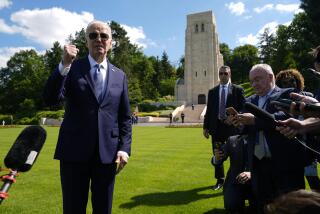President Flies to Bonn Talks : House Urges Him Not to Visit Bitburg Cemetery
- Share via
WASHINGTON — President Reagan left for West Germany Tuesday night still determined to visit the Bitburg war cemetery, even as the House of Representatives overwhelmingly approved a resolution urging him not to do so.
Secretary of State George P. Shultz, acknowledging the widespread criticism of the visit as the presidential party was preparing to leave Washington, said the “political price would be heavier” if it were canceled. The controversy, Shultz said, had only enhanced the ceremony at the cemetery as a symbol of the reconciliation of World War II enemies.
Debate over the Bitburg visit, which is scheduled for Sunday, continued to overshadow the three-day economic summit beginning Thursday at Bonn, where Reagan will discuss crucial issues of international economics with the leaders of six other major industrial nations.
In a departure statement at the White House, Reagan made no mention of Bitburg but said he is visiting Europe “determined to carry forward the spirit of peace and reconciliation among old adversaries and the power of our democratic ideals.” He called the friendship between the American and German people “dramatic proof of how former enemies can be brought together again.”
Before his Bitburg stop, Reagan will tour the Bergen-Belsen death camp, where he will make a speech emphasizing not only the need for reconciliation but also the horrors of the Holocaust. Reagan aides added the camp visit to his itinerary after an uproar developed over the 49 SS combat troops buried among the 1,887 German World War II dead at Bitburg.
Shultz, at a press briefing, said that Reagan still intends to lay a wreath at the cemetery.
“I think, with respect to the cemetery visit, it could be said that the more difficult the act of reconciliation, the deeper the meaning may be,” Shultz said. The vehement reaction to Reagan’s visit, he said, “shows how deep these wounds are and how difficult it is. We have to confront that as well as confront the horrors that we all are reacting to.”
The reaction continued Tuesday with a 390-26 House vote for a resolution urging Reagan to cancel the Bitburg visit. That action came on the heels of Senate approval by voice vote last Friday of a similar resolution sponsored by 80 of the 100 senators.
‘Salt in The Wounds’
“President Reagan’s planned visit to Bitburg,” said California Rep. Mel Levine (D-Santa Monica), “has rubbed salt in the wounds of hundreds of Holocaust survivors and has outraged American veterans. Perhaps even more important, it raises serious questions about the competence of this Administration to conduct a responsible viable foreign policy. . . . It has raised serious questions about this Administration’s judgment and sense of right and wrong.”
Rep. Ron Wyden (D-Ore.), said: “It’s not too late to do what’s right. . . . To change one’s mind in the face of new evidence is the essence of a strong man.”
But in Bonn, West German Chancellor Helmut Kohl hailed the “wonderful message” that Reagan intends to go ahead with the cemetery visit. He predicted that the ceremony will “prevail as a great achievement of a great President.”
Polls in the United States have shown that about half of Americans surveyed disapprove of the cemetery visit. Kohl said more than 70% or 80% of Germans “welcome the President and thank him for this gesture of friendship.”
Past Bitburg Observances
Meanwhile, an Air Force spokesman in Washington noted that officers of the U.S. Air Force’s 36th Tactical Fighter Wing at Bitburg Air Base, along with German and French soldiers, have attended West German memorial day ceremonies at the Bitburg cemetery for the past 25 years.
A wreath is placed on the central monument of the cemetery during the ceremonies, which commemorate the deaths of U.S., German and French soldiers on German soil during both world wars.
Before the seven-nation summit opens Thursday, Reagan will have private meetings with Kohl, Japanese Prime Minister Yasuhiro Nakasone, French President Francois Mitterrand and British Prime Minister Margaret Thatcher. Canadian Prime Minister Brian Mulroney and Italian Prime Minister Bettino Craxi also will attend the summit.
During his 11 days in Europe, Reagan also plans to pay state visits in West Germany, Spain and Portugal and has scheduled a major address before the European Parliament in Strasbourg, France.
More to Read
Get the L.A. Times Politics newsletter
Deeply reported insights into legislation, politics and policy from Sacramento, Washington and beyond. In your inbox twice per week.
You may occasionally receive promotional content from the Los Angeles Times.










